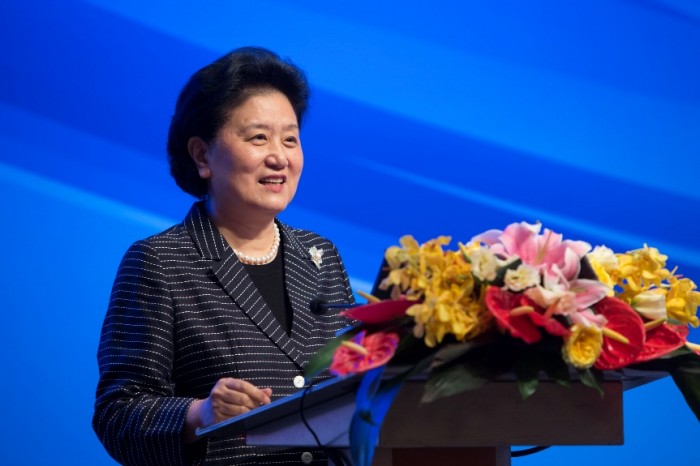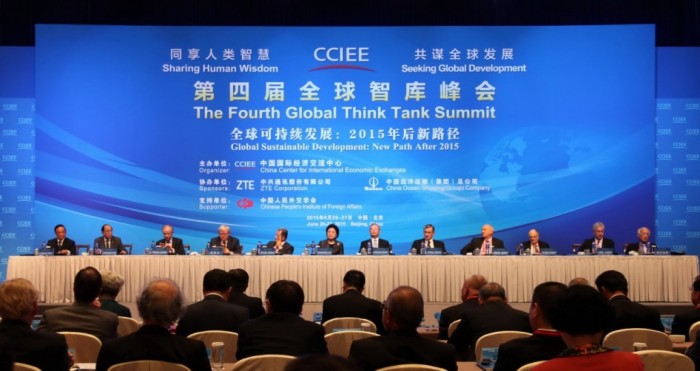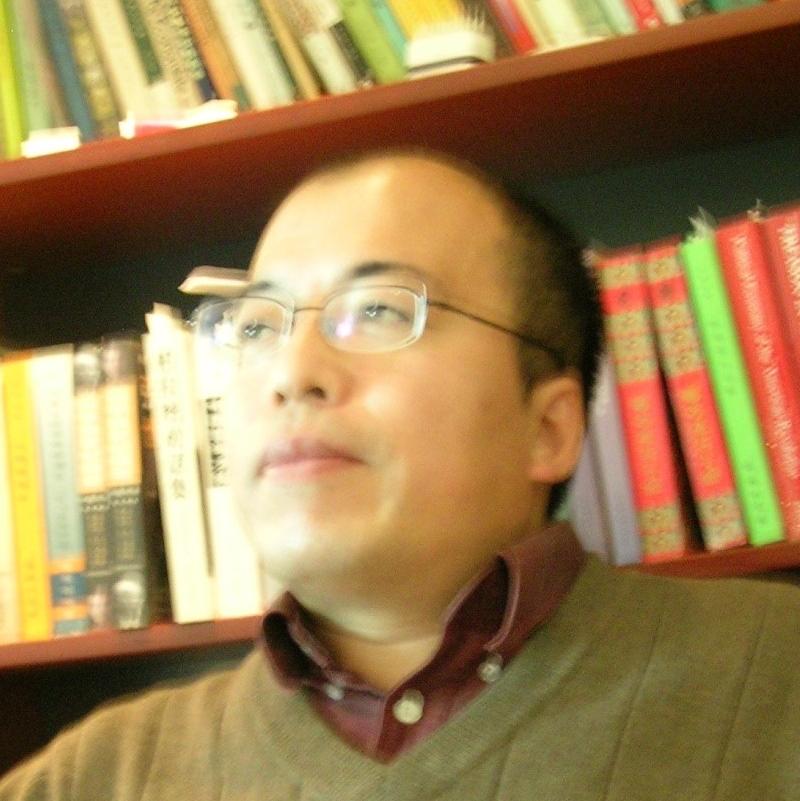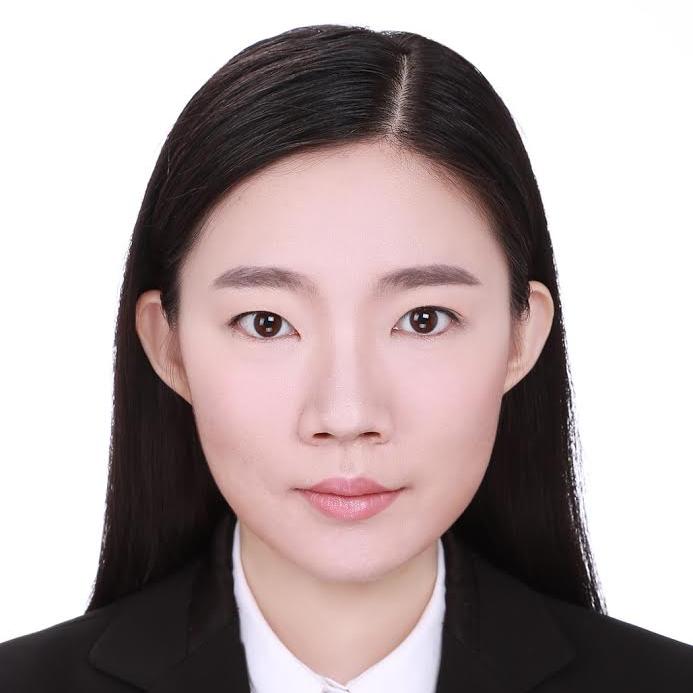—— Speech by Liu Yandong at the fourth Global Think Tank Summit in Beijing
June 26-27, 2015

Liu Yandong made a speech at the fourth Global Think Tank Summit on June 26, 2015.
SUMMARY:
The fourth Global Think Tank Summit was held in Beijing June 26-27, 2015. The summit, with the theme “Global Sustainable Development: New Path After 2015″, provides a platform for exchanges among think tanks from around the world.
Vice Premier Liu Yandong made the speech Join Hands for Global Sustainable Development at the summit, inviting the nations of the world to join in China’s strategy of opening up, which features mutual benefit and win-win outcomes.
The world’s goal of sustainable development has required an important consensus on the prospects of humanity’s progress. In 1992, the UN passed “Agenda 21”, a strategic framework for sustainability in economic growth, social progress, reasonable utilization of resources, and environmental protection, presenting a blueprint for humanity’s pursuit of sustainable development throughout the 21st century.
The ideal of harmony between man and nature is an integral part of the traditional values at the core of the Chinese civilization, says Liu Yandong. This year is the deadline for fulfilling the United Nations Millennium Development Goals; China was the first developing country to approve “Agenda 21”, and the first to achieve poverty alleviation goals ahead of schedule, ridding more than 600 million people of poverty. That was around 70 percent of all those who had risen above poverty worldwide over the same period.
Despite challenges such as the North-South gap in development, resource and environmental constraints, global climate change, as well as traditional and non-traditional security threats, expectations for sustainable development are higher than ever. This year is critical for compiling China’s Post-2015 Development Agenda. This year, China will fulfill all the targets and tasks for its 12th Five-Year Program, and make plans for the 13th.
In terms of per-capita gross domestic product, China lags behind more than 80 countries, with more than 100 million people living below the poverty line. But Liu Yandong says China will take no shortcuts, and urges the world’s nations to join together – and learn from each other — in making sustainable development central to strategies for social progress, economic growth and improvements in people’s livelihoods.

READ FULL SPEECH BELOW:
This is the last year for fulfilling the United Nations Millennium Development Goals; it’s also a year of key significance for compiling the Post-2015 Development Agenda. This year, China will fulfill all the targets and tasks for its 12th Five-Year Program, and make plans for the 13th. Themed “Global Sustainable Development: New Path After 2015”, the fourth Global Think Tank Summit is both timely and of far-reaching significance.
Sustainable development is an important consensus on the prospects of humanity’s progress. In 1992, the UN passed “Agenda 21”, putting forward a strategic framework for global sustainable development, highlighting such key tasks as promoting sustainable economic growth, sustainable social progress, reasonable utilization of resources, and environmental protection, presenting a blueprint for humanity’s pursuit of sustainable development throughout the 21st century. For more than 20 years, while making inspiring progress in sustainable development and fulfilling the MDGs, countries have encountered such challenges as the North-South gap in development, resource and environmental constraints, global climate change, as well as traditional and non-traditional security threats. Expectations for sustainable development, however, have never worn thin. Instead, they have grown ever more prominent, guiding humanity’s steps forward.
The ideal of harmony between man and nature is an integral part of the traditional values at the core of the Chinese civilization. Both the proposal of “harmony between heaven and man” and the idea “Dao follows its own way” reflect Chinese traditional philosophy’s profound wisdom to follow the order of and seek harmony with nature. China has always been a staunch proponent and practitioner of the philosophy of sustainable development. As the world’s largest developing country, China has a huge population, and has tremendous environmental pressures on its shoulders. Its per capita possession of fresh water, arable land, and forest resources accounts respectively for 28%, 40% and 25% of the world average. Such a national condition determines that sustainable development is China’s inevitable choice. China was the first developing country to approve “Agenda 21”, to compile its “Comprehensive Program for Energy Conservation and Emission Reduction” and “National Program on Addressing Climate Change”. China was also the first developing country to achieve poverty alleviation goals ahead of schedule, ridding more than 600 million people of poverty. That was around 70 percent of all those who had risen above poverty worldwide over the same period of time. China has popularized nine-year compulsory education in an all-round manner. With 260 million students enrolled at all forms and levels of institutions of learning, China now boasts the largest education system in the world. With the maternal mortality rate, infant mortality rate and mortality rate of children under age 5 continually dropping, China has fulfilled UN MDGs ahead of schedule.
In the meantime, we are keenly aware of the clear fact that China’s development remains imbalanced, inadequately coordinated, and unsustainable. In terms of per capita gross domestic product, China lags behind more than 80 countries. By UN standards, more than 100 million of our compatriots still live below poverty line. In recent years, China has persistently incorporated the idea of sustainable development into all aspects and the entire process of economic and social progress, and acted accordingly. The concept of sustainable development has found its way ever deeper into public awareness, and sustainability-oriented actions have become more determined and efficient.
■ China takes it as a strategic move toward sustainable development to improve the quality and efficiency of growth, and to upgrade the overall economy. Currently, China’s economic development has entered a state of “New Normal”. We continue to take development as priority no. 1 and have initiated the strategy of innovation-driven development. Our eyes are on the “dual targets” of maintaining moderate-to-high growth and striding toward the middle-to-high endon the spectrum of global development. We are at once stabilizing policies and anticipations as well as promoting reforms and restructuring. We are building “twin engines” for the undertaking — on one hand encouraging entrepreneurship and innovation in the general public, on the other hand providing more public goods and services. We are striving to make sure that the gear-shift does not dampen fine momentum, and that growth in quantity comes with higher quality, so as to materialize the anticipated upgrade of the Chinese economy.
■ China takes it as the main purpose of sustainable development to promote social progress and improvements in people’s livelihoods. In recent years, in spite of the impact of the international financial crisis and the slowdown in financial revenues growth, the Chinese government has not cut spending on public welfare. Instead, it has put in more. In 2014, 70 percent of government expenditures were on people’s livelihoods. We have given precedence to such aspects of public welfare as education, public health, employment, and old-age care. All in all, government inputs in national education and research and development account respectively for 4 percent and 2 percent of the country’s GDP. In 2014, the volume of transactions in the Chinese technology market surpassed 850 billion yuan, sustaining an average annual growth of above 15 per cent for nearly 20 years. Universal basic health care has covered more than 1.3 billion people, providing 7.6 billion person-times of various types of medical services last year. We will continue to implement even more proactive policies on employment and entrepreneurship, to build a fairer and sustainable social-security system, and to promote the equalization of basic public services.
■ China takes it as a pressing task for sustainable development to enhance environmental protection and cultivate ecological civilization. China is feeding one-fifth of the people on our planet with less than 10 percent of Earth’s arable land. Thanks to the mammoth population base and the extensive nature of the traditional mode of development, the constraints of resources and environment as bottlenecks have become increasingly prominent. Therefore, we have placed the building of ecological civilization in a more outstanding position, sparing no effort to promote green development, cyclic development, and low-carbon development, so as to build a beautiful China. China is both a huge producer and user of coal. Transformation of coal-related enterprises involves the immediate interests of millions of coal miners. However, we have been resolutely strengthening environmental protection, and actively promoting clean use of coal. The cities of Beijing and Tianjin have already shut down all coal-burning power plants in their cities proper. Hebei province cut its coal consumption by 15 million tons, iron and steel production capacity by 30 million tons, and that of cement by nearly 40 million tons. We have demonstrated zero tolerance to all behavior in violation of environmental laws, in order to leave behind an ideal environment for our posterity to live and work in, one that features bluer skies, greener land, and clearer water.
■ China takes it as the guarantee for the driving force of sustainable development to deepen reforms and govern the country in accordance with law in an all-round manner. We persistently pursue the comprehensive deepening of reforms in economic, political, cultural, social and ecological realms, push structural adjustment forward by means of structural reforms, set free the “invisible hand” of the market, and make good use of the “visible hand” of the government. We have been resolutely pressing ahead with streamlining of administrative procedures and delegating powers to lower levels. Over the past more than two years, State Council agencies have cancelled or delegated to local authorities 537 items subject to administrative examination and approval, honoring this administration’s promise to cut one-third of items subject to government approval more than two years ahead of schedule. At the central-government level, investment-related items subject to administrative approval have been reduced by 76 per cent; aside from some special exceptions, examination and approval procedures for overseas investment have been abolished altogether. Industrial and commercial registration has adopted the practice of issuing “licenses before permits”, 85 per cent of items requiring prior approval previously are now subject to posterior permits. At the central-government level, 420 past fees and funds charged by government agencies and professional institutions affiliated to the government have been abolished, suspended, reduced, or exempted, reducing nearly 100 billion yuan in financial burdens for enterprises and individuals each year. All such moves have greatly unleashed the entire society’s vigor for innovation. We have pressed ahead with governing the country in accordance with law in an all-round manner, enacting or revising such legislation as Law on Energy Conservation, Law on the Prevention and Control of Water Pollution, Law on the Prevention and Control of Atmospheric Pollution, Circular Economy Promotion Law, and Renewable Energy Law, laying a solid legal foundation for resource and environmental protection as well as the realization of sustainable development.
China actively strengthens comprehensive cooperation with the international community, joining hands with the rest of the world to promote sustainable development in a global context. We actively participate in bilateral and multilateral international cooperation and exchange with regard to environment, resource, and population, making every effort to promote the international community to take new actions targeted at sustainable development. Last year, China and the United States jointly published a Joint Announcement on Climate Change. This year, China will set up a fund for South-South cooperation on climate change, and provide $6 million to support the UN Secretary-General to push forward South-South cooperation in dealing with climate change. As a responsible developing country, China has provided support and assistance to more than 120 developing countries for their fulfillment of UN MDGs in accordance with its capabilities.
China will always pursue a strategy of opening up featuring mutual benefit and win-win outcomes. Its doors will open wider and wider to the outside world, and the environment for development will be more and more transparent, equitable, better regulated, and predictable. We have been actively formulating brand-new mechanisms of an open economy. We are gradually widening market access for investments, accelerating construction of free-trade areas, expanding opening up of inland areas along the country’s borders, and energetically exploring the regulatory model of “pre-entry national treatment plus negative list”. In the next five years, China will import more than $10 trillion worth of goods, Chinese overseas investments will exceed $500 billion, and out-bound Chinese tourists will surpass 500 million person- visits. The proposals for collaboration in jointly building the Silk Road Economic Belt and 21st Century Maritime Silk Road China have been put forward, featuring adherence to equal consultation, collaboration and sharing, and have received positive responses from more than 60 countries along the routes as well as international organizations. Preparatory work for the Asian Infrastructure Investment Bank has made substantial headway. China’s opening up has not only brought benefits to the 1.3 billion Chinese, but also created new opportunities for global sustainable development.
In the present time, the trends toward multi-polarization as well as economic globalization keep unfolding, informatization of societies proceeds. In the face of such non-traditional security issues and global challenges as terrorism, public health, cyberspace security, and climate change, interconnection and interdependence between countries are continuously deepening, resulting increasingly in a community of shared destiny where interests are tightly interwoven and no country can fare well without the support of others. Therefore, realizing sustainable development is a common responsibility of the international community; international cooperation is the only path to realize global sustainable development.
Last month, China submitted to the UN its latest position paper on the Post-2015 Development Agenda, which advocates that, on the basis of summing up the experiences in fulfilling the MDGs, the international community should join hands and compile a Post-2015 Development Agenda that is fair, inclusive, and sustainable. Promoting global sustainable development calls for the agglomeration of global wisdoms and strengths. I would like to take this opportunity to propose four suggestions for deliberation.
First, we believe win-win cooperation is an essential main thread in promoting global sustainable development. All countries, developed or developing, have on their shoulders the dual tasks of promoting economic recovery and sustainable development. They share a pressing need for adopting the concepts of green growth and inclusive development. We must adhere to poverty alleviation and development facilitation as the core of the Post-2015 Development Agenda, and promote balanced economic, social, and environmental development. All countries should treat one another equally, cooperate on a mutually beneficial basis, discard the obsolete zero-sum-game assumption that one party’s gains inevitably lead to the other party’s losses, embrace the new philosophy of win-win and all-win cooperation, show due concern for others’ interests while pursuing self interests, and facilitate common development while seeking self development. Just as President Xi Jinping said at this year’s Bo’ao Forum for Asia, only through win-win cooperation can countries do big things, good things, and things of lasting significance. As long as countries enhance policy coordination and pragmatic cooperation, make efforts to preserve the multilateral trade and investment mechanisms, jointly foster a great global market, and prevent market segmentation and rules differentiation, they will certainly be able to continuously and effectively promote global economic growth, and solidify the groundwork for global sustainable development.
Second, we believe joining hands for innovation is an effective approach to promoting global sustainable development. Innovation is a strategic strut for promoting economic development, social prosperity and advancement of civilizations. It is a powerful driving force for the world’s sustainable development. The time we are living in is one of intensive innovation, also one of innovation cooperation. With economic globalization deepening, and a new round of technological revolution and industrial transformation looming on the horizon, transnational flow of factors of innovation as well as global distribution of resources for innovation have become irresistible trends of our time. Against such a historical background, only by enhancing education development and raising people’s overall qualifications can we lay a solid foundation for innovation and invention in terms of talent reserve and intellectual support. Only through cooperation can we profit more from innovation at higher speed and lower cost, and become more competitive in innovation. The international community should join hands to comprehensively enhance innovation cooperation at multiple levels, in multiple realms and forms, exploit each country’s comparative advantages to their fullest, broadly share experiences of innovation, and facilitate the dissemination and sharing of its fruits, thereby promote innovation on larger scales and at deeper levels in the global context, and give full play to the tremendous role it plays in prompting sustainable development.
Third, we believe civilizations learning from each other is a critical brace for promoting global sustainable development. Culture is an in-depth driver for sustainable development. Only by translating the philosophy of sustainable development into cultural consensus, and into people’s spontaneous actions, can the world have a more beautiful future. In 2013, UNESCO convened an international symposium in Hangzhou, China, themed “Culture: Key to Sustainable Development”. The meeting explored how to give full play to culture’s peculiar advantages, and realize inclusive development. Answers to many of the common problems facing humanity could only be found through dialogue between civilizations as well as communication and exchanges. Especially at the present, when all human beings live in a closely interconnected global village, there is the pressing need for us to look at traditional development theories and development paths from the perspective of culture, for culture to become a support force for socio-economic progress as well as man’s all-round development, and for culture to demonstrate its peculiar advantages in increasing trust and dispelling suspicions, facilitating communication between hearts, and deepening friendship. All countries should embrace an outlook on civilizations with sustainable development at its core, understand and respect the differences between countries in cultural heritages, social systems, and development paths, with a broad mind like the sea refusing no river, as well as the readiness to accommodate and appreciate. They should draw on others’ strong points to make up for their own weaknesses while communicating with and learning from each other, stride ahead together while seeking common ground and preserving differences, solidify the social foundations of state-to-state relations and open up brand new prospects of global sustainable development through continuously deepening cultural and people-to-people exchanges.
Fourth, we believe preserving peace is a fundamental guarantee for promoting global sustainable development. Looking back on history, we can find, in spite of all the vicissitudes in the international arena, peace and development remain the main theme of our time, as well as the common interest of people of all countries. Without a peaceful and stable environment, global sustainable development will be out of the question. Only by keeping history in mind can we open up a better future. This year marks the 70th anniversary of the victory in the world anti-Fascist war, as well as that of the founding of the UN. We should draw lessons from history, jointly preserve the post-war international order with the UN Charter at its core, build a fair, just, inclusive and orderly international governance regime, consolidate the philosophy of peace in the hearts and souls of people of all countries, set sail for peace, and join hands to build and share a harmonious world featuring sustainable development.
The great thinker Sima Qian from ancient China’s West Han Dynasty left behind a famous line: “Devising strategies from a command tent, masterminding triumph from thousands of miles away”. Think tanks, as the “dream factories” of ideas and “reserve warehouses” of strategies, have become increasingly prominent in designing blueprints for development, facilitating win-win cooperation, and promoting humanity’s sustainable development. The Chinese government attaches great importance to think-tank construction. It has published “Opinions about Enhancing the Construction of New-Type Think Tanks with Chinese Characteristics”, in a bid to give full play to think tanks’ functions as “outer brains” and “advisers”, promote scientific and democratic decision-making, and facilitate the modernization of the national governance system and governance capabilities.
In order to further promote sustainable development, we are willing to listen to the rest of the world. We also welcome think tanks from all countries, to share with us opinions and suggestions about China’s development. We hope think tanks of all countries bring their advantages into full play, constantly come up with original and valuable thought products, contribute more pragmatic advices, and assume the responsibilities for advising on governance and enlightening the general public. We hope think tanks of all countries strengthen exchange and cooperation, brainstorm and compare notes with each other, inspire wisdom and always be on the lookout for global governance and development. We hope think tanks of all countries rise above such traditional realms of power politics and geopolitical rivalry, always cherish a friendly mind and engage more in friendly undertakings, open up broad prospects for mutually beneficial and win-win cooperation, and be facilitators of cultural and people-to-people exchanges.


